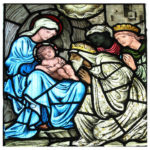We run our website the way we wished the whole internet worked: we provide high quality original content with no ads. We are funded solely by your direct support. Please consider supporting this project.

Why God Made You
The life God has for each one of us is a life of perfect love, one that eternally unites us with the Father, Son and Holy Spirit. This is why God made us. It’s what we long for, to love and be loved.
However, things like the love of the Trinity are not part of our normal language. So let’s unpack this a bit.
The great pastor and theologian Jonathan Edwards painted a portrait of the Trinity in which the love and joy of the three divine persons was so full and intense, it simply could not be contained. God’s fullness thus yearned to be expressed and replicated by sharing it with others. So this fullness overflowed as God brought forth a creation that mirrored his triune beauty.
The pinnacle of this creation is human beings, those who reflect, in a small way, the yearning to participate in the love of the Father, Son, and Holy Spirit.
The God of overflowing love longs to pour his love into others, so he creates beings that long for his love to be poured into them. This is why you were created. However, because of our rebellion, living without the fullness of God is a reality that shapes our daily lives.
It’s a state that is completely unnatural, an emptiness that points to our true purpose.
Jesus reveals this purpose when he prays to the Father that his disciples and “those who will believe in me through their message” would be “one as we are one.” (The entire prayer can be read in John 17.) Then he prays that he would be in us in the same way that the Father is in him. God apparently wants the loving unity of his own triune being to be replicated in the way we relate to one another as well as in the way he relates to us and dwells in us.
Then Jesus proclaims to the Father that he “will continue to make you [the Father] known in order that the love you have for me may be in them and I myself may be in them.” And he essentially says the same thing when he says to the Father, “I have given them the glory that you gave me” for the “glory” that the Father gives the Son and that the Son shares with us is simply the weighty, brilliant radiance of the self-giving love of the three persons of the Trinity.
This means that God’s ultimate goal in creation is nothing less than for the very same perfect love that the Father has for his own Son to be given to us and to be placed within us.
We become the recipients of the Father’s eternal love for the Son because we are in the Son as he is perfectly loved, and the Son is in us, as he is perfectly loved.
This is the true life that we created to experience. It’s what we thirst for. And nothing else, no other purpose, can quench it. While some of us may be blessed with loving people in our lives, with worthwhile work, and with some measure of security, no one, and nothing, could come close to meeting this need.
Only God can satisfy your longing for perfect, unconditional love, unsurpassable worth, and absolute security.
—Adapted from Benefit of the Doubt, pages 58-60
Photo via Visual hunt
Related Reading

The Future of Theology
Chris Moore via Compfight Roger Olson recently published a blog arguing that there really are no new ideas out there in the realm of theology. Everything has pretty much been thought of or proposed. That idea or book that’s causing such a stir? Rewarmed material that someone else already thought of. So what is there…

God’s Love and Your Freedom
The most distinctive aspect of the revelation of God in Christ is Jesus’ demonstration that God relies on love to defeat his enemies and to accomplish his purposes. More than anything else, it was the perfect love of God revealed in the incarnation, ministry, and self-sacrificial death of Jesus that in principle defeated evil and…

The Greatest Love Story Ever Told
This is the first week of Advent, the season where we anticipate the coming of Christ. It’s a time to hear and enter into the story of how Jesus came out of love to give his life for us. This grand love story of Christmas taps into a deep intuition we have about the centrality…

Lighten Up: Listening for the Voice of the Father
Christian comedian Michael Jr. posted this video last week for Father’s Day. What it says about love and connection and God in just a few minutes is so lovely. Enjoy.

Love OR Judgment – You Can’t Have Both
Image by Morgan Sessions We cannot judge others because it is not our place as humans to function as the center—because God is that center—and judge other people. In addition, we cannot judge others because we ourselves are sinners who deserve judgment. If we don’t want to be judged, Jesus says, we must not judge. The…

Featured Sermon Series: Scandalous Love
The Scandalous Love series is often considered one of Greg’s and Woodland Hill’s most foundational series. In fact, it was so important that it subsequently led to the Can’t Stop the Love series. Defining the true character of God is at the heart of what ReKnew is all about, so we wanted to host…
